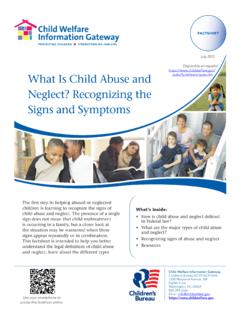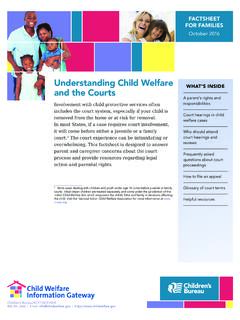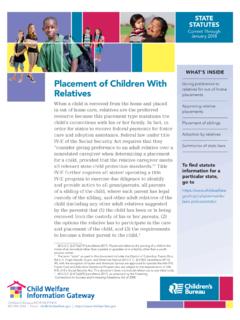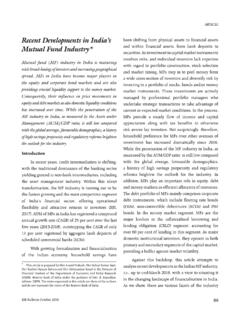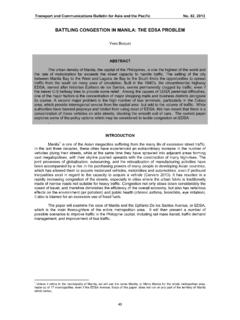Transcription of Supervising for Quality Child Welfare Practice
1 Children s Bureau/ACYF/ | Email: | FOR PROFESSIONALSA pril 2015 Supervising for Quality Child Welfare PracticeWHAT S INSIDEU nderstanding the importance of effective supervisionThe role of supervisors in Practice improvement Clinical supervisionSupporting and growing Child Welfare supervisors State and local examples of promising practicesResources and tools for enhanced supervision ConclusionReferencesSupervisors play a critical role in the delivery of effective Child Welfare services. They are responsible for ensuring that frontline workers have the requisite knowledge, attitudes, and skills to engage children and families; assess safety concerns as well as Child and family needs, strengths, and resources; make sound casework decisions; and develop and implement effective service plans.
2 Supervisors are key to translating agency policies and procedures for staff and ensuring that they are adhered to, in training and coaching staff and supporting their professional growth, and in helping workers to address the challenges of ensuring safety for children while strengthening and supporting their families. As Child Welfare agencies pay increased attention to ensuring Quality through systematic continuous Quality improvement efforts, supervisors must be particularly skilled in bringing the agency s vision to life by teaching and coaching, monitoring, and supporting caseworkers in a stressful environment, as well as leading Quality improvement processes. Supervisor success in these endeavors is critical for staff retention and for fostering positive outcomes among material may be freely reproduced and distributed.
3 However, when doing so, please credit Child Welfare Information Gateway. This publication is available online at for Quality Child Welfare Practice2 This bulletin for professionals presents an overview of Child Welfare supervision and explores the dimensions of supervision that agencies may want to consider as they seek to strengthen the effectiveness of their services to children and families. This bulletin is designed to provide Child Welfare supervisors, managers, and related professionals with examples of States efforts to strengthen supervisory capacity and with tools and resources to enhance supervisory skills. Understanding the Importance of Effective SupervisionResearchers have identified several keys to effective supervision, including the successful application of knowledge to Practice , connecting caseworkers to the agency mission, building supportive organizational structures, being an effective leader, and promoting success among employees.
4 Each of these elements is necessary for developing employee commitment and enthusiasm, for counteracting negative Practice , and for getting caseworkers and the agency back on the right track when unfortunate incidents occur (Summers, 2010). There is an extensive body of research in the Child Welfare field linking effective supervisory practices to positive outcomes for staff, agencies, and the children and families that their organizations serve. Supervisory effectiveness is felt most directly by the caseworkers being supervised. Research indicates that high- Quality supervision can prevent or reduce employee burnout and secondary trauma, which in turn reduces staff turnover rates (Collins-Camargo & Royse, 2010; Landsman, 2007; Brittain & Conrad, 2006).
5 A meta-analysis examining the impact of effective supervision on caseworkers found that positive supervisory skills are related to beneficial worker outcomes (Mor Barak et al., 2009). Specifically, studies indicate that effective supervision can mitigate caseworkers intention to leave their jobs, as well as actual staff turnover (Chen & Scannapieco, 2010; Fakunmoju et al., 2010; Renner, Porter, & Preister, 2009; Government Accountability Office, 2003). Supervision has even been identified as the organizational factor most consistently linked with caseworker retention ( Child Welfare League of America, 2005). The positive impact of high- Quality supervision on caseworkers goes beyond employee retention; it is also associated with higher levels of job satisfaction (Faller, Grabarek, & Ortega, 2010; Annie E.)
6 Casey Foundation, 2003) and organizational commitment (Landsman, 2001). Furthermore, it has been shown to lessen stressful work conditions, offer protection from unreasonable job demands, provide emotional support during difficult times, and give guidance on negotiating the challenges of the job (Mor Barak, Nissly, & Levin, 2001; Kadushin & Harkness, 2002). For some time, research has shown the importance of the supervisor by directly linking effective supervision with good Practice . Supervisors offer valuable educational, social, and administrative support, which can in turn contribute to worker effectiveness that translates into Quality service delivery (Kadushin & Harkness, 2002). Studies found that relationships between Quality supervision and improved worker capacity to define next steps and set limits in their cases (Banuch, 1999) increased service provision (McGrew & Bond, 1997), led to stronger client engagement (particularly with resistant individuals) (Bibus, 1993), and improved goal attainment among clients (Harkness, 1995).
7 When an agency implements a new model or reform, supervisors provide direction and support to caseworkers as they put new policies and procedures into effect and further provide workers with feedback on their implementation success. Supervisors also play an important role in increasing caseworker motivation, job-related critical thinking, and decision-making skills so that workers can better serve children and families (Fisher, 2009; Lietz, 2010; Rzepnicki & Johnston, 2005). Child Welfare Information Gateway s Management and Supervision web section offers a wide array of resources to help supervisors, managers, and administrators provide effective leadership and build a skilled workforce. The web section is available at 20215htslh: Role of Supervisors in Practice ImprovementIn August 2012, the Children s Bureau released an Information Memorandum (IM) on continuous Quality improvement (CQI), the process by which organizations identify, describe, and analyze strengths and problems and then test, implement, learn from, and revise solutions.
8 The IM outlines five key components of an effective CQI system: A strong foundational administrative structure Quality data collection An effective case record review process Analysis and dissemination of Quality data Feedback to stakeholders/decision-makers and adjustment of programs and processes to continually improve CQICQI also has become an important component of the upcoming third round of the Federal Child Welfare monitoring known as the Child Welfare Services Reviews (CFSRs). More information about CQI and the CFSR process is available in the June 2014 Children s Bureau Express ( ), the Bureau s monthly e-news digest that covers news, issues, and trends of interest to professionals in Child Welfare . Because supervisors play a key role in developing and enhancing the skills of Child Welfare professionals, they also play a pivotal role in implementing CQI processes and systems.
9 They help to create an organizational climate where CQI is expected and valued, modeling the use of evidence-informed Practice and those systems that promote it. An October 2012 issue of Training Matters, an e-newsletter published by North Carolina s Division of Social Services Children s Services Statewide Training Partnership, outlines the State s work implementing its CQI model, the Reaching for Accountability and Excellence in Practice , and the importance of supervisors in this application. The October 2012 issue of Training Matters is available at Roles, Competencies, and Processes That Promote Continuous Quality ImprovementSupervisory responsibilities can be categorized into three overarching domains: (1) administrative, (2) educational, and (3) supportive (National Association of Social Workers, 2013; Kadushin and Harkness, 2002).
10 The combination of all three components is necessary for the development of competent, ethical, and professional caseworkers. Each of these domains is critical to effective supervision and Quality Practice , and each one experienced renewed emphasis from a Quality improvement National Association of Social Workers (NASW) and the Association of Social Work Boards produced a booklet that provides an indepth discussion of supervision in social work and provides standards to ensure uniformity. Best Practice Standards in Social Work Supervision is available on the NASW website at AdministrativeAdministrative supervision involves enacting managerial methods that enable caseworkers to provide effective services to their clients (Hess, Kanak, & Atkins, 2009).




